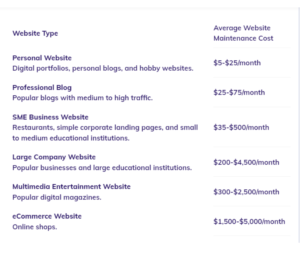How much does website cost? Have you been looking for answers regarding this topic? Well, the amount you spend on a website is entirely determined by your budget, objectives, and the style of website you desire. It also depends on a number of other factors, such as your domain name, web hosting, theme, plugins, and tools, among others.
In this article, we’ll show you in detail how much it costs to build your own website.
Ways You Can Create Your Website
When it comes to creating a website, you generally have three options:
- Engage the services of a website developer.
Professional web developers can build and launch your website for you.
Website designers do not have a set rate that applies to all websites. Website designers charge between $30 and $200 per hour around the world. Some web developers charge an upfront fee and then calculate the total price based on your specifications.
Pricing is also determined by the website’s content and whether you want a one-page website or multiple pages with a homepage, contact us, about us, and other features.
Upwork and Fiverr are two sites where you can find developers and freelancers. Keep in mind that a lower price does not always imply a better option. It’s critical to work with a developer who knows what they’re doing and is worth the money they charge.
- Work with an agency
Agencies typically have expert web designers, developers, graphic designers, and marketers working together, and you can tap into a pool of resources.
Website design costs can range from $500 to $10,000 or more, depending on the agency you choose and your needs.
After your site is built, most agencies will offer to manage it for you and charge you website maintenance fees. They will handle backend technical tasks and ensure that your website is up to date, backed up, and secure.
- Do it yourself (DIY)
There are many platforms, such as WordPress, Wix, and SquareSpace, that allow you to create your own website without knowing any coding! You don’t even need to know how to use HTML.
You can still construct a website within your budget if you’re establishing a small business and don’t want to spend a bunch on it.
You will have complete control over the customization of your site if you do it yourself. And, despite the fact that website creation appears to be a time-consuming process, it is actually fairly simple and can be completed in only a few hours.
What Are The Requirements To Build A Website?
It’s easier than you think to create a professional website on your own. It’s also cost-effective, which is ideal for small businesses.
Here are the top three needs for any form of website to get you started.
- The domain name (e.g. yourdomain.xyz)
- Hosting a website (depending on your website builder)
- Website creator (e.g. WordPress, Wix, Weebly)
- Domain Name
Your domain name, such as yourdomain.xyx is the internet address for your website. It’s the address that your visitors type into their browsers to get to your site.
For a year after you register a domain name, you have the right to use it for your website. If you wish to keep the same domain name for your site, you must renew it through the same domain name registrar. If you lose interest in a domain name, you can let it expire so that it can be purchased by someone else.
- Web hosting
Your website’s home is called web hosting. This is where you keep your website’s content and files.
When a visitor types your website’s address (domain name) into their browser, they will be led to the website files stored on your web hosting server.
Typically, web hosting refers to a corporation that rents out its computer/servers to host your website and provides internet connectivity to ensure that your website is accessible 24 hours a day, seven days a week.
Bluehost, GoDaddy, Hostgator, and SiteGround are some of the most popular web hosts. These businesses provide a variety of web hosting services, including:
- Shared hosting
- Dedicated hosting
- Managed WordPress hosting
- VPS hosting
- Blog hosting
- eCommerce hosting
- Shared Hosting
For entry-level website hosting, shared hosting is ideal. This is where your website will be housed alongside several other websites on the same server. All domains on a shared hosting plan share the same server resources, such as RAM (Random Access Memory) and CPU (Central Processing Unit) (Central Processing Unit). Pooled hosting plans, on the other hand, are relatively inexpensive because all resources are shared, making them a good choice for website owners in their early stages.
In most circumstances, newcomers will find shared hosting to be the most straightforward means of hosting their website; whether you’re a small business owner, a community group, or a stay-at-home mom who wants to blog, your site will be online. Many useful tools are included in shared hosting services, such as website builders, WordPress hosting, and the ability to email clients.
Although shared hosting offers website owners a more straightforward approach to the web, the downside is that you’ll be sharing the server with several other websites. This means that spikes in traffic can have an impact on the user experience on your website.
Website owners that do not receive a lot of traffic will benefit from shared hosting services.
- Dedicated Server Hosting
Dedicated hosting allows website owners to have maximum control over the server on which their website is hosted. That’s because you’ve rented the server solely, and your website is the only one on it. This means you have complete root and admin access, allowing you to manage anything from security to the operating system you use.
All of this power, though, comes at a cost.
One of the most expensive web hosting solutions is dedicated servers. They are typically utilized by website owners who have a lot of traffic on their site and need complete control over their servers. In addition, the installation and continuing operation of the system necessitates a high level of technical skill.
- Managed Hosting
The majority of hosting packages available online are likely to be managed. Technical services such as hardware and software setup and configuration, maintenance, hardware replacement, technical assistance, patching, upgrading, and monitoring are provided by hosting firms. The provider manages the hardware, operating systems, and standardized applications on a day-to-day basis using managed hosting.
When it comes to web hosting, there are many options to select from, but it all boils down to finding a package that meets your needs. Each plan is tailored to the demands of different groups, so knowing what you need in a website will help you choose the best plan for you and your company.
- Virtual private server (VPS) hosting
A VPS hosting package is the perfect compromise between shared and dedicated hosting. It’s the perfect solution for website owners who want greater control but don’t need a dedicated server.
Each website on a VPS server is housed in its own space on the server, while it still shares a physical server with other customers. While VPS hosting gives website owners more customization and storage capacity, it can’t withstand extremely high traffic or usage spikes, which means that the site’s performance might still be influenced by other sites on the server.
3. Website Builder
To create a website, whether you’re a complete novice or a seasoned designer or developer, you’ll need to use a website builder. A website builder, regardless of your skill level, makes it simple to create a website the way you want it. It also allows you to easily add essential features such as SEO tags, navigation menus, sidebars, and plugins.
Some builders act as an all-in-one platform, taking care of the domain name and web hosting for you. However, we do not recommend them because you lose control over the configurations, web development, and customizations of your site.
We strongly recommend WordPress.org over all other website builders on the market. It is the most adaptable and user-friendly web builder. It is commonly referred to as a content management system or CMS.
WordPress is number one for more than just us. This platform is also used by 40% of all website owners worldwide. You have complete control over the configurations, design, and functionality of your website.
There are themes and templates available to help you get started so you don’t have to start from scratch. Furthermore, it provides you with a plethora of options for customizing and enhancing your website in any way you see fit.
WordPress makes it simple to scale your website as it grows. This is something that many other builders do not have.
WordPress is open-source software that is free to use. To install WordPress and begin building a website on top of it, you’ll need to purchase a domain name and web hosting.
How Much Does Website Cost?
The cost of a website is heavily dependent on the type of website you want. Simple websites are significantly less expensive than eCommerce sites.
If you want to build a website with advanced features, you should be prepared to pay a higher price.
We’ve divided this section into three parts to make it easier to understand:
- The Price of Creating a Standard Website (Small business)
- The Price of Creating a High-End Website
- The Price of Creating an Online Store
How Much Does It Cost To Build A Website For A Small Business
Website development costs between $100 and $500, depending on your website’s or business’s needs.
You’ll need a budget for the domain name and web hosting if you want to build a small website. A domain name is between $3.88 -$69.99 per year, and web hosting is $1.88-$8.99 per month.
This means you can get started with as little as $122.87. This includes a domain name and a one-year hosting plan. This can be quite costly for you, especially if you’re just getting started.
Thank goodness for Bluehost deal which offers small businesses a free domain name for the 1st year, Free SSL certificate and hosting as low as $2.75 per month.
Following that, you’ll need a few tools to help you build and manage your website. We’ve selected the best free WordPress themes and plugins from the WordPress repository to help you save money.
Here are a few essential plugins you can download for free from WordPress.org:
- Google Site Kits: Get insights about how people find and use your site, how to improve, and monetize your content, directly in your WordPress dashboard
- WPForms lite: Build a contact form
- Rankmath : Improve your WordPress SEO (search engine optimization)
- SeedProd: Put your site into coming soon mode while it’s under construction
- UpdraftPlus: Back up your WordPress site
- Wordfence: Secure your website from hackers
- LiteSpeed Cache:Improve WordPress performance and speed
- Akismet: Prevent spam comments
- WP Mail SMTP: Resolve WordPress email issues
- Starter Templates: Import premade websites and templates
- Elementor: Customize your site with this user-friendly page builder
Approximate Cost:
The following is an estimate of the cost of an entry-level website:
Web hosting costs $33 (at $2.75 per month for 36 months).
1-year domain name: Free
SSL certificate for free
WordPress website builder for free
Free plugins and themes
To get started with building a regular or basic website on your own, you’ll need to invest $33. This price is a good starting point for bloggers, influencers, coaches, small businesses, or anyone looking to establish a basic online presence.
How Much Does Building an Advanced Website Cost?
Installing a free theme and plugins gives you a head start on creating a WordPress website on a shoestring budget. As your business grows and your needs change, you may want to add more features to your website.
Adding more features means that the cost of your custom website will rise.
If you anticipate growth, it’s a good idea to upgrade to a more powerful hosting service, such as Namecheap Hosting Plan.
Of course, it is a little more expensive than Bluehost. It does, however, include a slew of premium features, such as staging, faster performance, and the ability to handle up to 100,000 visitors per month.
Total Estimated Cost:
Your website setup cost can range between $500 and $2,000 per year, depending on the premium products you select. This estimate is appropriate for websites such as large and small business websites, big-time bloggers, and other sites that are rapidly growing.
How much does it cost to build an eCommerce website?
The eCommerce industry is booming, and studies show that it is growing three times faster than traditional retailers. If you want to get into the eCommerce business, now is the time to open an online store.
Having an online store allows you to expand your business all over the world, 24 hours a day, seven days a week. Best of all, when compared to offline businesses, it is simple to start an online store without breaking the bank.
You can use hosted platforms such as Shopify or BigCommerce. They provide an all-in-one solution for online stores by hosting their websites. However, you will not have as much control over your web design and customizations as you would like.
You can also create an online store on WordPress by using the WooCommerce plugin. It is the most popular and comprehensive eCommerce plugin for WordPress, and it is completely free.
You’ll need to purchase a domain name as well as a hosting plan, but you’ll have complete control over your website.
Total Approximate Cost:
If you want to build an entry-level eCommerce website powered by WooCommerce, we estimate the initial investment to be $466.20 over a three-year period.
How Much Does It Cost To Maintain A Website
The average website maintenance costs range from $5 to $5,000 per month, depending on the type. These figures, however, are only estimates. The costs of maintaining large and popular websites such as Amazon and Netflix far outweigh these figures.
The cost of maintenance varies depending on the services you use. A large eCommerce website, for example, necessitates different tools than a small portfolio site. If you buy premium software and tools or hire a service provider, your website maintenance costs will rise as well.
Here’s a breakdown of average monthly website maintenance costs by website type.
How Much Does A Website Redesign Cost
Do you have the impression that your website is flat or out of date when you look at it? Do you believe it could benefit from a redesign?
There are numerous factors to consider when redesigning a website, so it’s important to consider your needs and vision before making any decisions.
Before you begin the redesign process, you should ask yourself one important question: how much redesign does my site require? If the answer is “a lot,” it may be easier and less expensive to start from scratch. If the answer is “some,” continue with the redesign.
If you’ve decided to invest in a redesign, you must decide whether to do the work yourself, hire a freelancer, or hire a web design agency.
Do IT Yourself
If you decide to do the work on your own, you will invest more time but less money. You should consider whether you already have a skill set that would allow you to redesign your site on your own. If you don’t already have that skill set, you should seriously consider whether you want to invest the time and energy in learning about the tools and skills required for the redesign.
Redesigning a website on your own can cost anywhere between $0 and $300.
Hire A Freelancer
If you decide to hire a freelancer, you will free up more of your time at a cost. Working with freelancers has some drawbacks: you can’t be certain that they are reliable, they may not specialize in your industry, and redesigning an entire website may be too much work for one freelancer to complete in a timely manner.
Freelancers, on the other hand, are a fantastic option for a variety of reasons: they offer a wide range of prices, may have industry knowledge, and are typically very communicative. Many people place a high value on meeting your needs and realizing your vision.
Hiring a freelancer to redesign your website could cost you anywhere from $500 to $5,000. This is determined by the freelancer’s hourly rate (or if they charge a rate for each webpage) and the amount of work required for your website.
Hire A Website Agency
The third option is to hire a web design firm. Many of the same advantages are available to web design agencies as they are to freelancers. They are experts who can advise you on a variety of different decisions that you will need to make.
When you hire a web design agency, you can rest assured that your website is being worked on by a team of experts. They can conduct a competitor analysis and take over programming, content, and optimization.
When it comes to selecting the best website hosting option, web design firms can point you in the right direction. They can then monitor the service you receive from your hosting provider and make recommendations.
Working with a web design firm can cost anywhere between $3,000 and $100,000. Let’s help you drive profitable traffic to your website to get more sales and leads.
How to Avoid Overpaying When Building A Website
Starting small is the best way to avoid overpaying and save money. To save money, you can always look through the free WordPress theme and plugin directories to improve your website.
Once you’ve started attracting visitors, you should think about investing in a premium theme and premium plugins. Keep an eye out for WordPress deals and coupons to get huge discounts on your purchases to stay within your budget.
A growing business website will also require a more powerful hosting configuration than a basic website. It is also possible that you will need to optimize your WordPress server on a regular basis.






